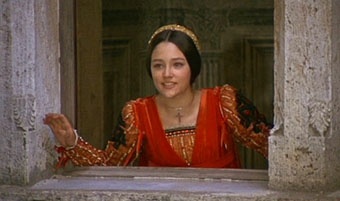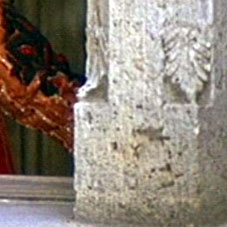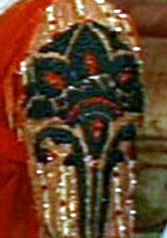|
|
|
ジュリエットの誕生日は7月31日。 今日はその2週間とちょっと前だという。 季節は七月の半ば… |

|
求婚者のパリスは、花だという。 なるほど… 男も花にたとえるのですね… 乳母は蝋人形のように完璧、とも言っているが。 蝋人形(^_^;; 蝋人形ってそのころからもうあったんですか? それはともかく、 キャピュレット夫人の台詞十二行は、押韻(ライム)ありの英雄詩体ニ行連句。 河合祥一郎さんによると、 「キャピュレット夫人が凝った修辞・様式(ひいては形式・世間体)に 過剰にこだわりジュリエットが形式的に答えるのがドラマの核となる。」 パリスというのは家柄esteemのいい貴族。 ライバルである。ゼフィレッリの映画でははしょられているが、 ジュリエットの墓に花を捧げに来て 鉢合わせになったロミオに殺されてしまう。(^_^;; |
|
|
マキューシオは大公の親戚で、ロミオの友達だ。 ジュリエットに対する乳母 ロミオに対するマキューシオ、この二人の台詞は長く、 散文になっている。 シェークスピアの劇は ブランクバース(無韻詩)※という詩形で書かれているのだが、 それから外れている。 また、ロミオとジュリエット本人の対話は、押韻のある、詩形。 美しすぎるほど美しい詩そのもの。 |
|
|
予感… |
|
|
|
「シェークスピアの英語」
by中嶋文雄(要約) シェークスピアの劇は他人に観る芝居でなく聞く芝居 湧き出るような豊富なことばの喚起する多彩のイメージが、 演劇性とともに、彼の劇の本質。 英国ルネッサンスの盛期は詩や音楽が愛好される 抒情の時代。その100年後の理性の時代とは、対照をなす。 初期の無韻詩と修辞的技巧 無韻詩=ブランク・ヴァースblank verce サリー伯がアエネイスの英訳(1557年)に初めて用いた 以来劇作の手段となり、中心的な作家はマーロウであった。 (Christopher Marlowe 1593没) シェークスピアはこれを彼から受け継いで完成。 初期の史劇は規則正しいブランク・ヴァースで書かれている。 …弱教五詩脚(iambic pentameter)の無韻詩 =一行に弱強リズムの詩脚が五つ、全行で十音節 ほとんど散文のところもなく、押韻する詩行もないが、 修辞的な装飾は豊富に見られる。 文芸復興期の学校では修辞学(rhetiruc)が重要視された。 押韻と抒情詩行 史劇に続く初期の喜劇では 叙情的な箇所には押韻もあり、又 低喜劇の部分には散文を用いている。 「恋の骨折り損」にはしゃれ(pun)が250もある。 言葉の競演といってよく注釈者の苦労する劇 散文の部分を除く全詩行のうち韻を踏むもの1150行。無韻584行。 これに続く「ロミオとジュリエット」…押韻746行無韻2102行 「夏の夜の夢」…押韻798行、無韻746行 これらは詩であることが劇の本質をなす。 散文の発達と無韻詩の自由化 初期の作品…低喜劇の場面は口語体の散文、 主題は修辞的または叙情的な詩行 詩と散文は7対1くらい 中期の作品…散文が圧倒的に多い 1対2くらいで多い 「ヘンリー四世」のフォールスタッフ以後、 主役にも散文の台詞を使わせるようになった。 高められた散文、詩行が散文的に → 修辞的朗読長の台詞が、自然の口語体に近づいていった。 詩と演劇性 創作三期…柔軟になったブランクヴァースと高められた散文 再び詩行が優勢に 「ハムレット」と「リア王」…詩行が散文の2倍半 イメージの働きが動作から遊離しないで演劇的に作用している。 端的日常的な比喩に 最高の文体 四大悲劇のsとの「アントニーとクレオパトラ」 円熟したブランク・ヴァース 言葉と情緒との一致 簡潔にして余韻に富む、巨匠の文体 シェークスピアの劇は詩である。 シェークスピアの劇を理解するためには、 学問や思想や性格論よりも、 その英語の鑑賞が本質的な重要性を持つ。 |
English Poetry
「英詩と日本詩人」佐藤勇夫著 北星社1973刊
ライム、フット、メター。 rheme韻=ライム foot=フット詩脚 古典詩では長短、英詩では強弱の組み合わせからなる meter韻律=強弱リズム 押韻=同じ韻or類似の韻を踏むこと 韻の有無による4つの分け方 Rhymed Verse 押韻詩強弱4歩格 trochaic tetrameter他いろいろのリズム Heroic Verse 英雄詩 Iambic pentameter「弱強」五格 各行10音節で、 二行づつ行末で韻を踏む ホメーロスの叙事詩の韻律のことも言うが別のもの 18世紀の伝統詩法 Blank Verse 無韻詩 Iambic pentameter弱強五歩格+脚韻なし Free Verse 自由詩 (一切のリズム形式に拘束されない詩) 男性韻…強音節or単音節がend-rhyme 女性韻…第一音節が強音節となる多音節語がend-rhyme 内容による2つの分け方 Epic Lyric Ode Sonnet |
五脚律Pentameter
|
|BACK|R&J INDEX(目次つき)|ブンガクINDEX|HOME| NEXT|
|
|
|
|



